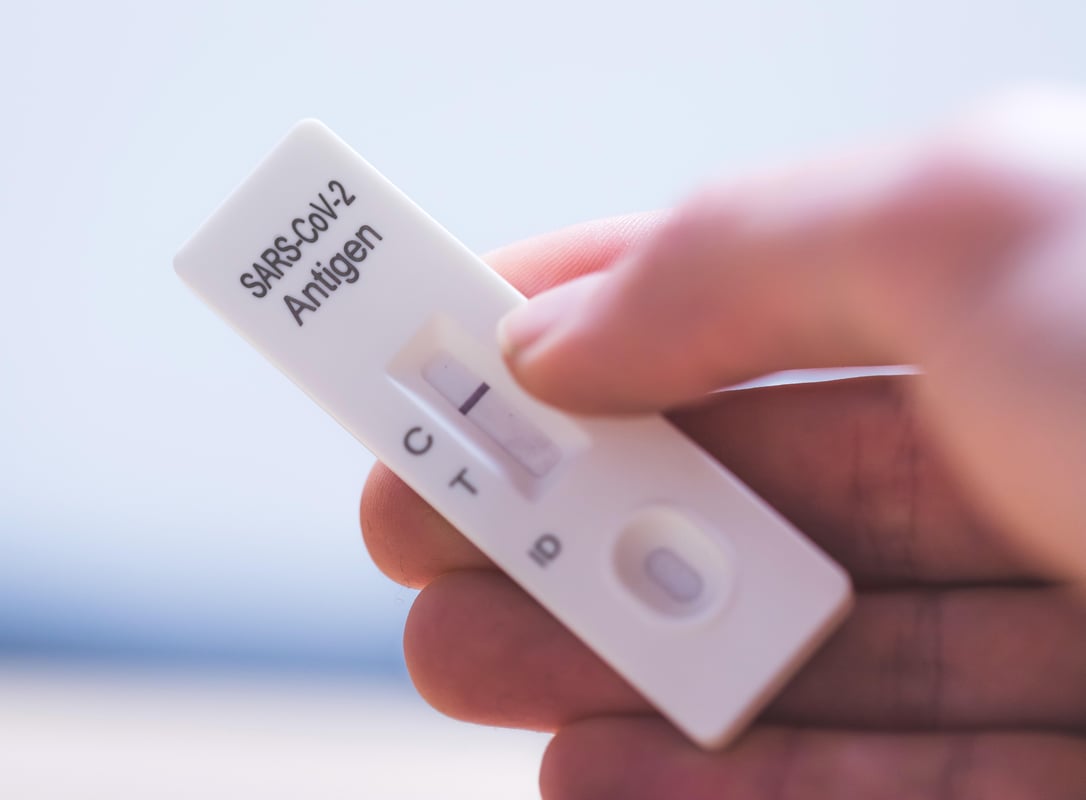Biden Unveils New ‘Test to Treat’ Plan as Key Part of New COVID Strategy

WEDNESDAY, March 2, 2022 (HealthDay News) -- A new "test to treat" plan will be a key part of a revamped national strategy to return the country to normal, President Joe Biden announced during his State of the Union speech Tuesday night.
The new testing initiative would provide Americans with new antiviral medications as soon as they learn they are infected, Biden said during his speech.
“I know you’re tired, frustrated and exhausted,” Biden said. “But I also know this: Because of the progress we’ve made, because of your resilience and the tools that we have been provided by this Congress, tonight I can say we are moving forward safely, back to more normal routines.”
The White House has been working on a new coronavirus response strategy, which unnamed officials told The New York Times would be introduced on Wednesday. The sweeping plan would include developing new vaccines and treatments while coming up with ways to keep schools and businesses open even if new variants surface and surge.
The “test to treat” concept appears to be a centerpiece of the new strategy. Under the program, Biden said, Americans could get tested for the coronavirus at a pharmacy and, if they are positive, “receive antiviral pills on the spot at no cost.”
Although the pills, made by Pfizer, have been relatively scarce since the U.S. Food and Drug Administration approved them late last year, Biden said in his speech that “Pfizer is working overtime to get us one million pills this month and more than double that next month.”
The initiative will include educating the public about the availability of new antiviral treatments and the importance of taking them as soon as symptoms start, an official told the Times. The federal government will also distribute antiviral pills directly to long-term care facilities.
“I cannot promise a new variant won’t come,” Biden said. “But I can promise you we’ll do everything within our power to be ready if it does.”
Top federal health officials have also been poring over a 136-page blueprint from outside experts whose recommendations include stronger air filtration systems in public buildings, billions of dollars in research and a major upgrade to the nation’s public health system.
Although the country's caseload is dropping, many Americans remain at risk. On Monday, New York State health officials released data showing that the Pfizer vaccine is much less effective in preventing infection in children ages 5 to 11 than in adolescents or adults, and children under 5 are not yet eligible to be vaccinated.
Meanwhile, an estimated 7 million Americans have weakened immune systems, illnesses or other disabilities that make them more vulnerable to severe COVID. The White House announced last week that it would make masks and coronavirus tests more accessible to people with disabilities.
“We’re leaving no one behind or ignoring anyone’s needs as we move forward,” Biden said Tuesday night.
Most state and local governments across the country have already dropped their mask mandates and the U.S. Centers for Disease Control and Prevention loosened its mask guidance last week.
The guidance no longer relies solely on case counts to decide whether masks and other safety measures are needed. Roughly 70 percent of Americans can stop wearing masks for now, and they no longer need to socially distance or avoid crowded indoor spaces, the CDC has said.
More information
Visit the U.S. Food and Drug Administration for more on COVID treatments.
Related Posts
AHA News: Flu-Related Myocarditis Is Rare But Can Be Fatal, as Ohio Family Learned
MONDAY, July 10, 2023 (American Heart Association News) -- Last December, during...
USPSTF: Hormone Therapy Not Advised for Primary Prevention of Chronic Conditions
TUESDAY, Nov. 1, 2022 (HealthDay News) -- The U.S. Preventive Services Task...
Extreme Heat Exposure Tied to Faster Cognitive Decline in Vulnerable Populations
FRIDAY, Aug. 25, 2023 (HealthDay News) -- Extreme heat exposure can...
¿Tiene preguntas sobre las pruebas de COVID a domicilio? Un experto en farmacia tiene respuestas
JUEVES, 3 de febrero de 2022 (HealthDay News) -- Ya hay una mayor disponibilidad...
